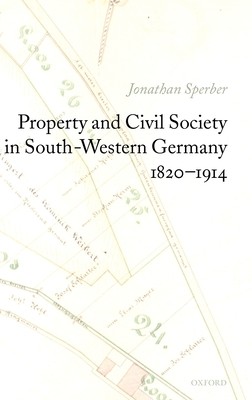
- We will send in 10–14 business days.
- Author: Jonathan Sperber
- Publisher: Oxford University Press, USA
- ISBN-10: 019928475X
- ISBN-13: 9780199284757
- Format: 15.6 x 23.4 x 1.8 cm, kieti viršeliai
- Language: English
- SAVE -10% with code: EXTRA
Property and Civil Society in South-Western Germany 1820-1914 (e-book) (used book) | bookbook.eu
Reviews
Description
Historians have often employed the concept of civil society, an intermediary realm between the family and the state, to analyse nineteenth-century Europe and North America. They have concentrated on voluntary associations, the press and public meetings, the constituent elements of Jürgen Habermas's 'public sphere', in doing so overlooking a central element of nineteenth-century civil society: property and its disposition, whether within the family or in the marketplace.
This book examines the place of property in the society of south-western Germany during property's nineteenth-century golden age. It analyses the culture of property ownership and property transactions within families, among business partners and competitors, and among creditors and debtors. The work considers the boundaries of property, outlining relationships between neighbouring property owners, and showing how property ownership helped shape social distinctions between men and women, Christians and Jews, the upper and lower classes, the sane and the insane, and between honourable and dishonourable actions. It traces the development of property relations and property transactions from the end of the Napoleonic era to the eve of the First World War. The book's conclusion compares conditions in south-western Germany with those elsewhere in Europe and North America, and considers changes in property relations occurring in Germany during the age of total war and in the post-1945period in the light of structures and developments in the nineteenth century. Based on extensive documentation from civil court records, Property and Civil Society in South-Western Germany presents its results through the recounting of intriguing, sometimes bizarre, but always revealing stories of legal disputes. A reconsideration of the nature of civil society, an analysis of nineteenth-century social development and social conflict, a study of the nature and action of the law in everyday life, the book is also an ironic and bemused look at the past human condition.
EXTRA 10 % discount with code: EXTRA
The promotion ends in 22d.22:52:34
The discount code is valid when purchasing from 10 €. Discounts do not stack.
- Author: Jonathan Sperber
- Publisher: Oxford University Press, USA
- ISBN-10: 019928475X
- ISBN-13: 9780199284757
- Format: 15.6 x 23.4 x 1.8 cm, kieti viršeliai
- Language: English English
Historians have often employed the concept of civil society, an intermediary realm between the family and the state, to analyse nineteenth-century Europe and North America. They have concentrated on voluntary associations, the press and public meetings, the constituent elements of Jürgen Habermas's 'public sphere', in doing so overlooking a central element of nineteenth-century civil society: property and its disposition, whether within the family or in the marketplace.
This book examines the place of property in the society of south-western Germany during property's nineteenth-century golden age. It analyses the culture of property ownership and property transactions within families, among business partners and competitors, and among creditors and debtors. The work considers the boundaries of property, outlining relationships between neighbouring property owners, and showing how property ownership helped shape social distinctions between men and women, Christians and Jews, the upper and lower classes, the sane and the insane, and between honourable and dishonourable actions. It traces the development of property relations and property transactions from the end of the Napoleonic era to the eve of the First World War. The book's conclusion compares conditions in south-western Germany with those elsewhere in Europe and North America, and considers changes in property relations occurring in Germany during the age of total war and in the post-1945period in the light of structures and developments in the nineteenth century. Based on extensive documentation from civil court records, Property and Civil Society in South-Western Germany presents its results through the recounting of intriguing, sometimes bizarre, but always revealing stories of legal disputes. A reconsideration of the nature of civil society, an analysis of nineteenth-century social development and social conflict, a study of the nature and action of the law in everyday life, the book is also an ironic and bemused look at the past human condition.


Reviews